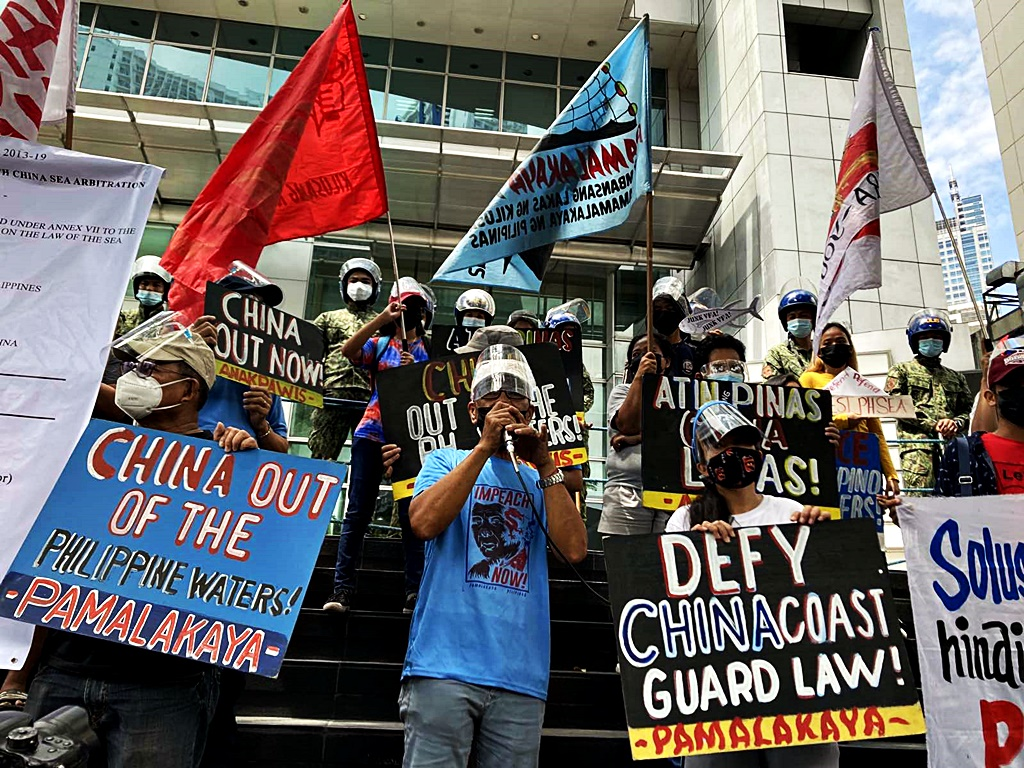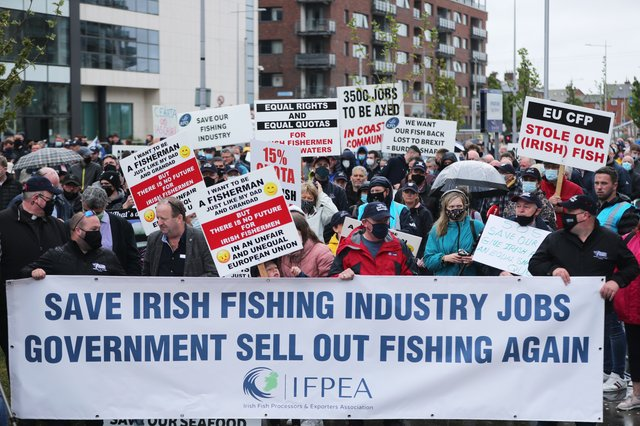The following analysis of the plight of Fishermen in the Free State and the Philippines has been contributed by an International supporter of Anti Imperialist Action Ireland. AIA continues to stand with the Fishing Communities.
“Well, we heard about Ireland wanting to join the EEC as it was called then. I wasn’t sure what it meant for me immediately, I thought that it just had something to do with trade and nothing else, that fishing wasn’t going to be affected or farming as well, that it just had to do with manufacturing and things like that you know. Then in brother-in-law in Sinn Fein started talking to me about it, at the time it was a worry for him, but bigger things were happening, and he had a sense that it wouldn’t matter in 5 years’ time, as things would be changed you know. He cut out things in the newspaper I remember, and from An Phoblacht, saying how the small farmer, as every ordinary fella was then, was going to be finished and a thing of the past because of this new EEC. The lot of that is true now. Then as things went on and I had my own child we had very little money, I knew then what was wrong, when I got the last boat I had it was big enough for where we were, but the European trawlers started to come then and they were a good few times the size, and they didn’t have to worry about their stocks or hurting their quotas at home where ever they were coming or going from. Then we had the supertrawlers being heard of in later years, maybe 15 or 20 years ago, and nothing was done about them because they never needed to come to port, all the processing was done there on the ship and they had smaller boats and trawlers drawing to them. It was said at the time before about the farmers how the fisherman would be destroyed too and that’s what just happened. I was only starting out when this came in, but it finished me for good at that stage, I’m retired now but never made a too much of a living.”-Irish fisherman
When one thinks about the Ireland, one might not immediately think of the Philippines. However, these two island countries share a common struggle, while being across the world from each other. As one will see, while the six counties of occupied Ireland are a direct colony of Britain who exercise colonial control and exploitation over that part of Ireland’s fisheries, the Free State and the Philippines are still very much semi-colonies of imperialist superpowers and continue to be exploited to this day, even though it is claimed that they have been granted so-called independence. When it comes to the issue of fishing, many do not think of it as a natural, renewable resource; however, the Irish and Filipino fishing industries have been historically suppressed by not only colonizing countries, but now their respective local administrations, while said superpowers continue to steal their wealth. In this piece, the history, and current conditions of both the Irish and Filipino fishermen will be discussed, and what we can do to support them in their common struggle.
With British colonization of Ireland, the Irish have never had full control over their waters or their fish. From the 17thcentury onwards, laws were enacted to protect the British fishers rather than the Irish. The Irish fishermen were not allowed to actively fish while the British were in the water, and conditions deteriorated to the point many Irish fishermen decided to immigrate elsewhere. Britain had effectively killed any chance of a thriving Irish fishing industry by decentralizing the ports and only allowing Irish fishermen to own boats less than 46 feet long, so only small catches were possible. [1] The British feared what was potentially an enormous industry for Ireland and did not want the competition. As what most colonizers do to a colony, they killed any chance for an independent industry to thrive without the colonizer’s involvement.
After the partition of Ireland, the Free State administration also neglected the fishing industry, viewing it as a “social service in line with the industry’s history in impoverished areas.” [2] It is unfortunate the Free State administration did not recognize that these areas were impoverished, because of the centuries of fishing suppression by the British who hoarded the wealth of one of Ireland’s natural resources, fish. In 1964, the London Convention was passed, and it created a 12-mile fishing limit off the coast of any country, however, in Ireland’s case; “allowed the French, Dutch, Spanish and British…to fish up to six miles off the Irish coast.” [3] [4]
A few years later, when the Free State was joining the European Economic Committee (EEC), the EEC formed the Common Fisheries Policy (CFP), essentially giving all the countries in the EEC equal control over their own waters. Another aspect of the CFP was that it was “Based on stock assessment models completed at the time, it was known that there needed to be some sort of catch limit for fishers, and the most efficient way to allocate numbers was through a quota system.” [5] As previously stated, the Irish were already at a disadvantage as the industry had been suppressed and neglected by both the British and Irish governments before joining the EEC. The catch limit for the Free State was already low when the CFP was put into place.
All of this leads to where Ireland’s fishermen in the 26 counties are at today. As it stands, due to the European Union Common Fisheries Policy, Irish fishermen are only allowed to catch 15% of fish in Irish waters, while “foreign vessels…catch up to 85% of fish.” [6] The EU enforces this by arresting and detaining Irish fishermen for surpassing their designated quota. [7]If this does not change, one fifth of Irish fishermen will be forced to quit, as they are unable to support themselves on such little quotas. Additionally, these fishermen must watch approximately100 truckloads of Irish fish caught by EU countries being shipped off to Europe a week. [8] The EU is exploiting one of the 26 counties greatest and most renewable resources.
Irish fishermen are not taking this exploitation lightly. In 2021, many fishermen organized flotillas into Cork and then Dublin to protest the oppressive quotas and changes caused by Brexit, including a “15 percent reduction in their annual permitted catch.” [9] Representatives from the flotilla have stated it is “estimated to be costing individual fishermen and women between €5,000 and €20,000 in lost income.” [10] Cormac Burke of the Irish Fishing Sea Food Alliance states, “the likely outcome now being that the pelagic vultures across the EU will all pick at this carcass and Ireland will be lucky to get 40% of a 12,000-tonne quota that they originally owned 100% of.” He goes on to claim that the Free State administration has allowed “the ‘management’ of this industry be controlled by two bodies with a dreadful history in their administration of this industry.” [11] It is no wonder Irish fishermen are demanding a higher quota, nationalization of waters, the right to fish at Rockall, and an end to the EU requirement that they must weigh their catch at the port. If these demands are not met, the fishermen have stated they will continue actions, such as blocking ports and a nationwide flotilla. [12]

Moving across the globe to the Philippines, this cluster of islands like Ireland has had a long history of their fishing industry being placed into the hands of their colonizer. Whether it be the United States, Japan, and now China; the Philippines has been fighting exploitive practices from these countries for well over a century. Up until 1932, there were no regulations in place concerning the fishing industry. When the Fisheries Act was put into effect, it allowed the United States’ “citizens and corporations to access fishing grounds.” [13] In 1973, the Philippine-Japan Amity Treaty was put into effect. This allowed Japan “reciprocal rights…to exploit [the Philippines’] collective marine resources.” [14]
A few years later, in 1978, the United Nations created the Law of Sea Treaty. One positive aspect of this was the small-scale fisherfolk were allowed the right to fish up to seven kilometers from the shoreline. However, this law also includedthe right to create an Exclusive Economic Zone, and the Philippines “extended its marine resources from 411,668,600 acres to cover a total of 522,863,600 acres.” Unfortunately, as the fishing waters were already being used by other nations such as Japan and the United States, the Philippines had not fulfilled the requirement of “full utilization of [its] resources.” The punishment was that other nations were allowed to fish in the Philippines waters without taxation on their profits. [15] In 1998, the small-scale fishers’ allowance of seven kilometers was increased to fifteen kilometers from the coastline. [16] However, with these revisions to the laws, there is still a large export economy in the fishing industry, leaving 800,000 small-scale Filipino fisherfolk to compete with large international corporations. [17] In 2016, while the Philippines ranked 10th in the world for producing fish, its fishers earned about $3-4 a day. Consistently since the 2010s, fisherfolk have the “highest poverty incidence in the country.” [18]
While these conditions have set small-scale fisherfolk up for failure, one of the biggest issues they face is the interference of China in their water. In 1995, China took control of Mischief Reef and created worse conditions for the Filipino fisherfolk. Since then, China has “intensified its aggressive occupation of the Philippines’ EEZ.” [19] In a April 2021 letter to the UN asking for relief from the Chinese interference, the Filipino fisherfolk group, Pamalakaya, stated that the “activities of China ha[d] brought about the loss of…(around USD 100 million)” to the fishing industry, and about $687 million worth of destruction to the coral reef in the West Philippine Sea. [20]
Starting in 2019, China has increased its military presence in the West Philippine Sea, so much so it has even constructed a military base there. [21] Even with supposed protections in place, Filipino fisherfolk continue to have their waters invaded by the Chinese Coast Guard, effectively cutting them off from their only source of income and food. The Communist Party of the Philippines has stated that the “continuing incursions of China on Philippine seas are a direct violation of Philippine national sovereignty and must be vigorously opposed by the Filipino people” and that “millions of dollars’ worth of Philippine marine and mineral resources are being siphoned off by China” and that “they are after hundreds of billions more.” [22]
Two years later, and the situation has only intensified between the Filipino fisherfolk and China. The Filipino fisherfolk group, Pamalakaya, demanded China to move their military base and ships out of the West Philippine Sea, claiming that China had “no right and moral ascendancy to impose a fishing ban under the pretext of conservation as they are the ones plundering marine resources through reclamation and annexation activities.” [23] They went on to state that “there is actually an indefinite and undeclared fishing ban in nearly the entire South China Sea, courtesy of the continued presence of Chinese vessels that create intimidation among Filipino fishers.”[24] Unfortunately, the Philippines’ government does not care about what is happening to its own fishers. As one can see in the Current President of the Philippines, Rodrigo Duterte’s statement, “I’m not so much interested now in fishing. I don’t think there’s enough fish to quarrel about.” [25] Meanwhile China’s response it that of threatening the Philippines and demanding they “respect China’s sovereignty and jurisdiction and stop taking actions that may complicate the situation.” [26]
With all this in mind, it is no wonder that we can still call the supposed Free State and the Philippines semi-colonies. Whether they are being exploited by the European Union or China, Ireland and the Philippines not only have to compete against these superpowers, but the fishermen themselves are ignored by their respective home administrations while they try to survive in poverty.
Communists can assist those fishermen who are being impacted by these oppressive forces by supporting and listening to those who are currently active in the struggle, such as the Irish Fishing and Seafood Alliance and the Filipino group, Ang Pamalakaya. Raising awareness of our common struggles is part of the battle against imperialist forces worldwide and connecting them will surely strengthen that cause.
End Notes
[1] Purcell, Betty. “Fishing Controversy: A Case History of Imperialism.” Magill, February 1, 1978. https://magill.ie/archive/fishing-controversy-case-history-imperialism.
[2] Ibid.
[3] Ibid.
[4] Greenwood, Miriam. Seafood Supply Chains: Governance, Power and Regulation. S.l., New York: Routledge, 2020.
[5] Walter, Tiffany. “The EU’s Common Fisheries Policy: A Review and Assessment,” May 2010. http://aei.pitt.edu/29777/1/WalterFisheries2010EUMAedi.pdf.
[6] Roche, Barry. “One in Five Fishermen Will Be Forced to Quit without EU Policy Change – Fishing Boss.” The Irish Times. The Irish Times, September 29, 2021. https://www.irishtimes.com/news/ireland/irish-news/one-in-five-fishermen-will-be-forced-to-quit-without-eu-policy-change-fishing-boss-1.4686025.
[7] “Exploiting Irish Fishermen – the EU’s Common Fisheries Policy.” The Fisher’s Voice, September 28, 2021. https://www.youtube.com/watch?v=tqNYmCWTsfA.
[8] Ibid.
[9] Osborne, Simon. “That’s Why We Left! Ireland to Lose Thousands of Tonnes of Fish after EU Quota Punishment.” Express.co.uk. Express.co.uk, February 16, 2021. https://www.express.co.uk/news/world/1398419/ireland-fishing-eu-common-fisheries-policy-annual-quotas-brexit-latest-news.
[10] Michael, Neil. “Flotilla Arrives in Dublin to Deliver ‘Symbolic’ Warning to Taoiseach.” Irish Examiner, June 23, 2021. https://www.irishexaminer.com/news/arid-40320386.html.
[11] Burke, Cormac. “The Ghost of Christmas Past….” IFSA – Your Voice. IFSA – Your Voice, December 16, 2021. https://www.irishfishingseafoodalliance.org/post/the-ghost-of-christmas-past.
[12] Michael, Neil. “Flotilla Arrives in Dublin to Deliver ‘Symbolic’ Warning to Taoiseach.”
[13] Ani, Princess Alma, and Meliza A. Festejo-Abeleda. “The Philippine Fisheries Code: National Policy for Sustainable Fisheries.” FFTC Agricultural Policy Platform (FFTC-AP), July 16, 2013. https://ap.fftc.org.tw/article/512.
[14] Blitz, Amy. “Marine Fishing in the Philippines.” Cultural Survival, June 1, 1987. https://www.culturalsurvival.org/publications/cultural-survival-quarterly/marine-fishing-philippines.
[15] Ibid.
[16] Turgo, Nelson. “A Taste of the Sea: Artisanal Fishing Communities in the Philippines.” Accessed December 27, 2021. https://link.springer.com/chapter/10.1007/978-3-030-49825-2_2.
[17] Blitz, Amy. “Marine Fishing in the Philippines.”
[18] Turgo, Nelson. “A Taste of the Sea: Artisanal Fishing Communities in the Philippines.”
[19] Pamalakayaweb. “Urgent Appeal to the United Nations to Investigate the Impact of Chinese Aggression and Plunder in the West Philippine Sea on the Right to Food and Livelihood of Filipino Fisherfolk.” Ang Pamalakaya, April 30, 2021. https://angpamalakaya.org/2021/04/30/urgent-appeal-to-the-united-nations-to-investigate-the-impact-of-chinese-aggression-and-plunder-in-the-west-philippine-sea-on-the-right-to-food-and-livelihood-of-filipino-fisherfolk/.
[20] Ibid.
[21] “Regime Coerces Fishermen to Withdraw Writ of Kalikasan Petition.” PRWC Newsroom, July 25, 2019. https://prwcinfo.wordpress.com/2019/07/21/regime-coerces-fishermen-to-withdraw-writ-of-kalikasan-petition/.
[22] “Protest Passage of China Warship through Sibutu Strait and Swarm of Fishing Vessels around Pag-Asa Island.” PRWC Newsroom, August 4, 2020. https://prwcinfo.wordpress.com/2019/07/31/protest-passage-of-china-warship-through-sibutu-strait-and-swarm-of-fishing-vessels-around-pag-asa-island/.
[23] Santo, Tina, and Karl Ocampo. “Ph Protests as China Reimposes Annual Fishing Ban ‘without Basis’.” inquirer.net, May 20, 2021. https://globalnation.inquirer.net/196379/ph-protests-as-china-reimposes-annual-fishing-ban-without-basis.
[24] Ibid.
[25] “Duterte ‘Not Interested’ in Confronting China on Fishing Rights.” The Maritime Executive. The Maritime Executive, April 20, 2021. https://www.maritime-executive.com/article/duterte-not-interested-in-confronting-china-on-fishing-rights.
[26] “Philippines Rejects China Fishing Ban and Wards off Chinese Vessels.” The Japan Times, May 16, 2021. https://www.japantimes.co.jp/news/2021/05/05/asia-pacific/philippines-china-fishing-ban/.
Bibliography
Ani, Princess Alma, and Meliza A. Festejo-Abeleda. “The Philippine Fisheries Code: National Policy for Sustainable Fisheries.” FFTC Agricultural Policy Platform (FFTC-AP), July 16, 2013. https://ap.fftc.org.tw/article/512.
Blitz, Amy. “Marine Fishing in the Philippines.” Cultural Survival, June 1, 1987. https://www.culturalsurvival.org/publications/cultural-survival-quarterly/marine-fishing-philippines.
Burke, Cormac. “The Ghost of Christmas Past….” IFSA – Your Voice. IFSA – Your Voice, December 16, 2021. https://www.irishfishingseafoodalliance.org/post/the-ghost-of-christmas-past.
“Duterte ‘Not Interested’ in Confronting China on Fishing Rights.” The Maritime Executive. The Maritime Executive, April 20, 2021. https://www.maritime-executive.com/article/duterte-not-interested-in-confronting-china-on-fishing-rights.
“Exploiting Irish Fishermen – the EU’s Common Fisheries Policy.” The Fisher’s Voice, September 28, 2021. https://www.youtube.com/watch?v=tqNYmCWTsfA.
Greenwood, Miriam. Seafood Supply Chains: Governance, Power and Regulation. S.l., New York: Routledge, 2020.
Michael, Neil. “Flotilla Arrives in Dublin to Deliver ‘Symbolic’ Warning to Taoiseach.” Irish Examiner, June 23, 2021. https://www.irishexaminer.com/news/arid-40320386.html.
Osborne, Simon. “That’s Why We Left! Ireland to Lose Thousands of Tonnes of Fish after EU Quota Punishment.” Express.co.uk. Express.co.uk, February 16, 2021. https://www.express.co.uk/news/world/1398419/ireland-fishing-eu-common-fisheries-policy-annual-quotas-brexit-latest-news.
Pamalakayaweb. “Urgent Appeal to the United Nations to Investigate the Impact of Chinese Aggression and Plunder in the West Philippine Sea on the Right to Food and Livelihood of Filipino Fisherfolk.” Ang Pamalakaya, April 30, 2021. https://angpamalakaya.org/2021/04/30/urgent-appeal-to-the-united-nations-to-investigate-the-impact-of-chinese-aggression-and-plunder-in-the-west-philippine-sea-on-the-right-to-food-and-livelihood-of-filipino-fisherfolk/.
“Philippines Rejects China Fishing Ban and Wards off Chinese Vessels.” The Japan Times, May 16, 2021. https://www.japantimes.co.jp/news/2021/05/05/asia-pacific/philippines-china-fishing-ban/.
“Protest Passage of China Warship through Sibutu Strait and Swarm of Fishing Vessels around Pag-Asa Island.” PRWC Newsroom, August 4, 2020. https://prwcinfo.wordpress.com/2019/07/31/protest-passage-of-china-warship-through-sibutu-strait-and-swarm-of-fishing-vessels-around-pag-asa-island/.
Purcell, Betty. “Fishing Controversy: A Case History of Imperialism.” Magill, February 1, 1978. https://magill.ie/archive/fishing-controversy-case-history-imperialism.
“Regime Coerces Fishermen to Withdraw Writ of Kalikasan Petition.” PRWC Newsroom, July 25, 2019. https://prwcinfo.wordpress.com/2019/07/21/regime-coerces-fishermen-to-withdraw-writ-of-kalikasan-petition/.
Roche, Barry. “One in Five Fishermen Will Be Forced to Quit without EU Policy Change – Fishing Boss.” The Irish Times. The Irish Times, September 29, 2021. https://www.irishtimes.com/news/ireland/irish-news/one-in-five-fishermen-will-be-forced-to-quit-without-eu-policy-change-fishing-boss-1.4686025.
Santo, Tina, and Karl Ocampo. “Ph Protests as China Reimposes Annual Fishing Ban ‘without Basis’.” inquirer.net, May 20, 2021. https://globalnation.inquirer.net/196379/ph-protests-as-china-reimposes-annual-fishing-ban-without-basis.
Turgo, Nelson. “A Taste of the Sea: Artisanal Fishing Communities in the Philippines.” Accessed December 27, 2021. https://link.springer.com/chapter/10.1007/978-3-030-49825-2_2.
Walter, Tiffany. “The EU’s Common Fisheries Policy: A Review and Assessment,” May 2010. http://aei.pitt.edu/29777/1/WalterFisheries2010EUMAedi.pdf.

